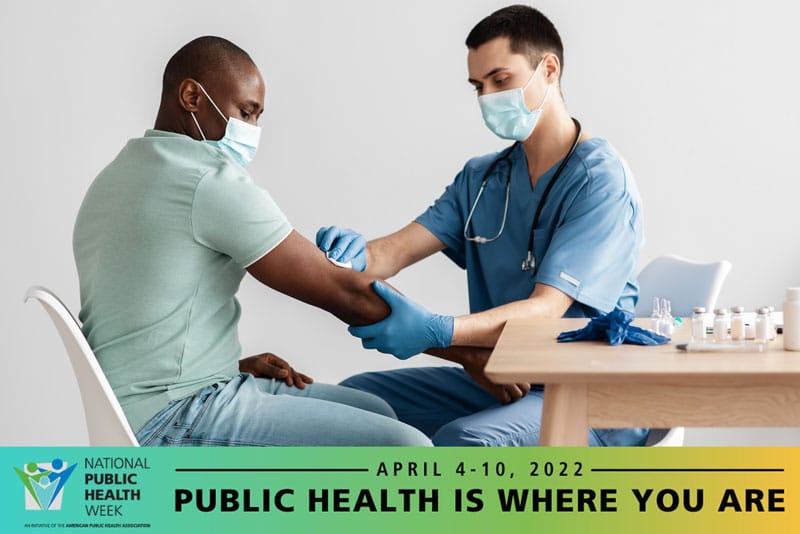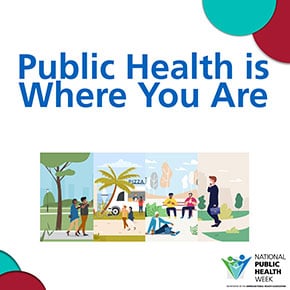National Public Health Week and Moultrie County

This week, we highlight National Public Health Week and the work of our local health department to improve public health in our communities.
The Moultrie County Health Department (MCHD) is proud to support National Public Health Week (April 4-10, 2022). The 2022 theme is “Public Health Is Where You Are.”
Why do we have Public Health?
Throughout history, the maintenance of human health has been paramount to human existence. Leaders of civilizations across the centuries have sought to reduce the threat of illness and disease.
They’ve done so by implementing activities and mechanisms to protect and restore the health of their people. Here are a few examples from the fascinating history of public health.
- As early as 1000 BC, ancient Shamans created herbal remedies to ward off disease.
- In 401 AD, the Roman Empire developed medicine and sanitation practices to maintain the health of its military.
- In 1798, Edward Jenner developed the first smallpox vaccine after studying why some individuals became ill from smallpox while others did not.
Our current personal and public health practices continue to evolve in an ever-increasing effort to help everyone live in a healthy, safe, and sustainable manner.
What does Public Health do for you?
The Moultrie County Health Department provides services related to adult health, children’s health, maternal-child health, community health, and environmental health.
Specifically, the work of the MCHD focuses on disease prevention, health promotion, and environmental and public health protection. The following are examples of the services we offer to address these areas:
Disease Prevention
- Communicable disease - The MCHD conducts daily surveillance and follow-up on communicable diseases. We do this as required to maintain and protect individuals and the public’s health and safety.
- Vaccines - We offer a full spectrum of all required vaccines for children from birth through age 18. We also offer many adult vaccines.
- Lead poisoning prevention – The MCHD provides public information and individual screening and testing services for lead exposure.
- Vector-Borne Disease Prevention program - We strive to reduce incidents of insect-borne diseases such as West Nile Virus and Lyme Disease through public and individual education.
Health Promotion
- Maternal and Child Health programs
- WIC offers nutrition, health assessments, referrals, and follow-ups for pregnant women, infants, and children (age 0-5 years).
- Family Case Management provides health and service coordination for families with children, including children with special needs.
- Healthworks of Illinois (HWIL) is a healthcare program that serves children engaged in foster care.
- Other General Health programs
- Take Charge of Your Health Programs – The MCHD provides evidence-based education classes for individuals of all ages in the self-management of chronic illnesses. These include but are not limited to diabetes, heart disease, cancer, and more.
- School Health & Pre-School programs – The MCHD works with schools and individual families to provide immunization record reviews and vision and hearing screenings for children ages 3-18.
- Blood Pressure and other essential health service screenings are available by appointment at the MCHD.
- Environmental and Public Health Protection
- Food safety - The MCHD provides routine inspections of all food service facilities in Moultrie County. We also offer guidance and education for all temporary food events held in Moultrie County.
- Water well safety - The MCHD issues permits and conducts inspections of all water and geothermal well installations, revisions, and closures to ensure the protection of groundwater supplies.
- Septic systems - The MCHD is responsible for permitting and inspecting septic system installations and revisions to ensure safe and sanitary disposal of human waste.
- Public Health Emergency Preparedness - The MCHD participates in annual emergency response training and exercises in conjunction with local and county emergency response partners.
How can you help Moultrie County build healthy communities?
During this week, please consider one or more of the following ways you can support public health week:
- Consider using services provided by the MCHD. We offer vaccines, clinical services, health education, environmental health, and other services. Learn more about how you, your family, or someone you know could benefit from these services.
- Don’t forget that public health and personal health are closely related. The MCHD works with individuals and their physicians to assist them in attaining optimum health and well-being.
We encourage you to take the time to take care of yourself. - Tell your friends and family about the MCHD and the services we provide. Visit our website, follow us on Facebook, and watch for our ads in local newspapers. We encourage you to stay in touch with us for timely information and guidance on various health topics.
- Most importantly, let us know how we can serve you and your family, organization, neighborhood, and community. Together, we can make sure “Public Health Is Where You Are” in Moultrie county.
This institution is required to post the USDA Nondiscrimination Statement. HTML version. PDF version.
USDA Nondiscrimination Statement
In accordance with Federal civil rights law and U.S. Department of Agriculture (USDA) civil rights regulations and policies, the USDA, its Agencies, offices, and employees, and institutions participating in or administering USDA programs are prohibited from discriminating based on race, color, national origin, religion, sex, disability, age, marital status, family/parental status, income derived from a public assistance program, political beliefs, or reprisal or retaliation for prior civil rights activity, in any program or activity conducted or funded by USDA (not all bases apply to all programs). Remedies and complaint filing deadlines vary by program or incident.
Persons with disabilities who require alternative means of communication for program information (e.g., Braille, large print, audiotape, American Sign Language, etc.) should contact the State or local Agency that administers the program or contact USDA through the Telecommunications Relay Service at 711 (voice and TTY). Additionally, program information may be made available in languages other than English.
To file a program discrimination complaint, complete the USDA Program Discrimination Complaint Form, AD-3027, found online at How to File a Program Discrimination Complaint and at any USDA office or write a letter addressed to USDA and provide in the letter all of the information requested in the form. To request a copy of the complaint form, call (866) 632-9992.
Submit your completed form or letter to USDA by:
- mail: U.S. Department of Agriculture, Office of the Assistant Secretary for Civil Rights, 1400 Independence Avenue, SW, Mail Stop 9410, Washington, D.C. 20250-9410;
- fax: (202) 690-7442; or
- email: program.intake@usda.gov.program.
USDA is an equal opportunity provider, employer, and lender.


